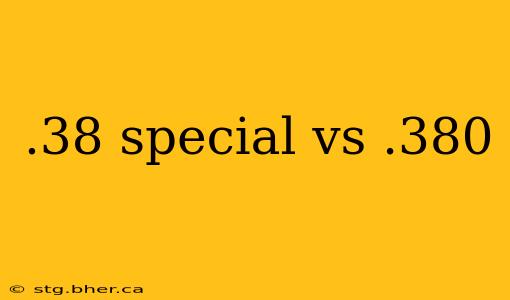.38 Special vs .380 ACP: A Detailed Comparison for Self-Defense and More
Choosing the right caliber for self-defense or target shooting can be a daunting task. Two frequently compared cartridges are the .38 Special and the .380 ACP (Automatic Colt Pistol). While both are relatively small calibers, they offer distinct advantages and disadvantages. This comparison will delve into the key differences to help you make an informed decision.
Ammunition Capacity and Firepower
One of the most significant differences lies in the ammunition capacity and resulting firepower. The .38 Special, a revolver cartridge, typically holds 5 or 6 rounds in a standard revolver cylinder. While some larger revolvers exist, this capacity limits the number of shots available in a self-defense situation. Conversely, the .380 ACP, a semi-automatic pistol cartridge, allows for higher capacity magazines, ranging from 6 to 10 rounds, or even more in extended magazines. This increased capacity offers a tactical advantage in prolonged engagements.
The .38 Special generally delivers more stopping power due to its larger bullet diameter and heavier bullet weight options. While .380 ACP ammunition is available in various bullet weights and designs, the .38 Special often boasts higher muzzle energy and momentum. This translates to a potentially greater impact on a target.
Recoil and Shootability
Recoil is a crucial factor for many shooters, especially those new to firearms. The .38 Special generally exhibits more recoil than the .380 ACP. This is due to the higher power and heavier bullet weight. While manageable, the stronger recoil can affect accuracy and control, particularly for smaller or less experienced shooters. The lighter recoil of the .380 ACP makes it more comfortable for extended shooting sessions and is often preferred by those with smaller hands.
Weapon Availability and Cost
Both calibers enjoy widespread availability, with numerous manufacturers offering firearms chambered in .38 Special and .380 ACP. However, the .380 ACP generally has a wider selection of semi-automatic pistols available at various price points, making it a more accessible option for some budget-conscious buyers. Revolvers in .38 Special, while also widely available, tend to have a slightly higher average cost, particularly those made by well-known manufacturers.
Accuracy and Range
The effective range of both calibers is relatively similar. Both are better suited for close-quarters self-defense situations rather than long-range engagements. Accuracy depends heavily on the firearm itself, the shooter's skill, and the ammunition used. While some might argue that the .38 Special's larger bullet might provide marginally better accuracy at longer ranges, the difference is generally negligible in real-world self-defense scenarios.
Penetration and Stopping Power
.38 Special generally offers superior penetration, especially with heavier, full metal jacket (FMJ) rounds. This can be both an advantage and a disadvantage. Greater penetration can be beneficial for stopping a threat through barriers, but it also increases the risk of over-penetration, posing a hazard to bystanders. .380 ACP ammunition, while less penetrative, offers adequate stopping power, especially with hollow point rounds designed for expansion on impact. The choice ultimately depends on individual needs and situational awareness.
Conclusion: Which Caliber is Right for You?
The decision between .38 Special and .380 ACP hinges on individual priorities and intended use. The .38 Special offers greater stopping power and penetration but with higher recoil and lower capacity. The .380 ACP boasts higher capacity, lower recoil, and greater ease of use, but with potentially less stopping power and penetration. Consider your experience level, physical capabilities, intended application (self-defense, target practice, etc.), and personal comfort levels when making your choice. Always practice safe gun handling and seek professional instruction before handling firearms.
